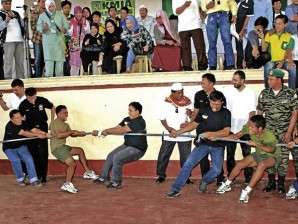
MEMBERS of the Moro Islamic Liberation Front (MILF) and the Philippine Army’s 103rd Brigade test their strengths in a game of tug-of-war in October last year to celebrate the formal signing of the framework peace agreement between the government and MILF negotiators in Malacañang. RICHEL V. UMEL
ZAMBOANGA CITY—The last time they met, heads rolled as blood flowed in what was seen as one of the most grossly lopsided encounters between soldiers and Moro rebels in Basilan.
On Jan. 4, pleasantries, not bullets, were exchanged in Al-Barka town. The erstwhile protagonists shared food and coffee in a meeting arranged by the Malaysian-led International Monitoring Team (IMT), which was overseeing the ceasefire between the military and the Moro Islamic Liberation Front (MILF).
Lead peace negotiators of the government and the MILF signed in Manila in October last year a historic framework agreement on the Bangsamoro toward ending the decades-long Moro insurgency in Mindanao.
Many of the rebels who came to Barangay Magkawa in Al-Barka, like Dan Asnawi and Hud Limaya, have been wanted by the law for their supposed roles in the deaths of 42 government troopers in 2007 and 2011.
Beheaded
Fourteen of the soldiers were beheaded.
The military has filed murder charges against Asnawi and Limaya for their alleged roles in the deaths of 19 soldiers and officers on Oct. 18, 2011, and the deaths of 23 Marine soldiers on July 10, 2007.
Col. Carlito Galvez, commander of the Basilan-based 104th Infantry Brigade of the Philippine Army, said the Al-Barka meeting was born out of a short notice.
“It was actually not part of our scheduled activities. A member of the IMT suggested to us to make a surprise visit to the [MILF] camp there. We agreed and we went there without any fanfare,” Galvez told the Inquirer by phone.
TWO MONTHS after the signing of the peace agreement, gestures of reconciliation abound between Moro guerrillas and government soldiers. Col. Carlito Galvez, head of the 104th Army Brigade, embraces Dan Laksaw Asnawi, head of a Moro Islamic Liberation Front command. JULIE S. ALIPALA
Aware of past military debacles in the town’s jungles, Galvez said he agreed to meet with the MILF leaders, including Asnawi and Limaya, because “if we want to achieve genuine peace with the rebels, we must start somewhere, and this is an opportunity we cannot easily ignore.”
Peace-building
Maj. Franco Alano, acting spokesperson of the Western Mindanao Command based in Zamboanga City, said the meeting was part of the series of dialogues tied to the signing of the framework accord.
Families of soldiers who died in the 2007 and 2011 attacks in Al-Barka might resent the meeting, Alano said, but he stressed that the “healing process is a must, and we need to make them understand.”
Striking peace was also important for the military, he said.
While the cases and the arrest warrants against Asnawi and Limaya are still live, Alano said “legal actions are beyond the AFP now.”
“We are doing this as part of the confidence-building measures and to facilitate and increase coordination between our tactical units so that development programs will flourish in Al-Barka, with the help of the Japanese government,” Galvez said.
Abdurasad Sirajan, MILF action officer of Ad Hoc Joint Action Group for Western Mindanao, described the meeting “as historical and very festive.”
“It was the first time in the history of Basilan for military commanders from both sides to come face-to-face, embrace each other, share food served on banana leaves and dreams for Basilan,” Sirajan said.